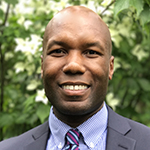JACKSON, Miss. – Eight doctoral students from four Mississippi universities have been selected as members of the second cohort of the Robert Smith, M.D. Graduate Scholars Program as part of the Jackson Heart Study Graduate Training and Education Center at the University of Mississippi Medical Center.
The second cohort of UMMC-GTEC scholars consists of three students from UMMC, three from the University of Mississippi, one from Mississippi State University and one from the University of Southern Mississippi.
UM students Alexcia Carr, from pharmacy; Cellas Hayes, pharmaceutical sciences; and Rashun Miles, social welfare, will join five other doctoral students to embark on the research opportunity beginning with a summer institute scheduled for July 27-31. In response to the COVID-19 pandemic, the year’s summer institute will have an online format.
Part of the broader National Institutes of Health-funded Jackson Heart Study, the largest community-based study of cardiovascular disease risk factors in African Americans, UMMC-GTEC is a two-year research training and mentoring program. Designed for doctoral and health professional students who are considering careers in cardiovascular health sciences, the didactic program allows students to participate in the research process alongside mentors from leading research institutions.
Marino Bruce, professor and director of faculty development in Department of Population Health Science in the John D. Bower School of Population Health at UMMC, is the new principal investigator and co-director for UMMC-GTEC. Before coming into this role, Bruce was research associate professor of medicine, health and society, associate director of the Center for Research on Men’s Health, and director of the Program for Research on Faith and Health at Vanderbilt University, where he also served as the first science director for UMMC-GTEC.
“Research training and mentoring the next generation of scientists from underrepresented backgrounds is a critical component of the effort to reduce health disparities in the United States while improving the health of all populations,” Bruce said. “Dr. Bettina Beech, the original principal investigator for UMMC-GTEC, has cast a bold vision for our scholars to work with some of the nation’s top biomedical researchers to contemplate and contribute to the scientific literature.
“I am honored to follow Dr. Beech in this role and to elevate the legacy of excellence in research, training and mentoring that she established at UMMC and in Mississippi.”
Applicants for the program must be doctoral and health professional students at UM, MSU, USM or Jackson State University. They must be from a group identified by the National Institutes of Health as underrepresented in the biomedical, clinical, behavioral and social sciences, and they must be U.S. citizens or permanent residents.
“Mississippi has been a rich source of talent, creativity and innovation for our nation, and UMMC-GTEC is designed to invest in promising doctoral students who are interested in careers in biomedical research,” Bruce said. “Our goal is to help develop a cadre of scholars from underrepresented backgrounds who can have distinguished careers in cardiovascular science in particular and health science in general.”
Roland J. Thorpe Jr., professor in the Department of Health, Behavior and Society at Johns Hopkins Bloomberg School of Public Health, is the new co-director of UMMC-GTEC. An original member of the UMMC-GTEC investigator team, Thorpe succeeds Keith Norris.
At the Bloomberg School of Public Health, he is co-director of Johns Hopkins Alzheimer’s Disease Resource Center for Minority Aging Research, deputy director of Hopkins Center for Health Disparities Solutions and director for the Program for Research on Men’s Health. Thorpe has established a distinguished record of minority aging and health disparities research across the life course focusing on racial and socioeconomic health disparities, particularly among men in the United States.
“Complementary to the scholars’ existing graduate training, this program will create a diverse community of scholars who will embrace all aspects of the research process to prepare evidence-based information to inform health-promoting strategies and policy-relevant solutions for all residents of Mississippi,” Thorpe said.
The two-year program will provide an intense research training and mentoring experience. Scholars commit to attending a five-day summer training institute for two consecutive summers, one midyear meeting, quarterly webinars and traveling to a Jackson Heart Study Vanguard Center at Johns Hopkins University.
One of the benefits is that scholars will have regular interaction with senior researchers and mentors throughout the program. Mentors will help the scholars learn to write peer-reviewed manuscripts, conduct analyses and make scientific presentations.
The 2020-22 cohort of the Robert Smith, M.D. Graduate Scholars Program also includes: Nicole Reeder, studying food science, nutrition and health promotion at MSU; Maria Jones-Muhammad, neuroscience, UMMC; Jamarius Waller, medicine and experimental pharmacology and therapeutics, UMMC; Torrye Evans II, medicine, UMMC; and Roxanne Watts, counseling psychology, USM.
A native of Terry, Smith is one of Mississippi’s heroes of health care. He is nationally respected as founder of the Medical Committee for Human Rights.
As part of the civil rights movement of the 1960s, this organization successfully pressured health care institutions across the South to expand access to health services for, and end unequal treatment of African Americans. He founded Mississippi Family Health Center in 1963 and remains a practicing physician.


